The Music Circle Instrumental Academy focuses on ensuring that students achieve excellence in their instrument while enjoying their musical experience. Different pathways in the Instrumental Academy help every child grow at an appropriate pace, while giving them the right environment and support to realise their full potential.
All students in the Instrumental Academy undergo training with The Music Circle Method, to ensure they have a clear and steady path to progress.

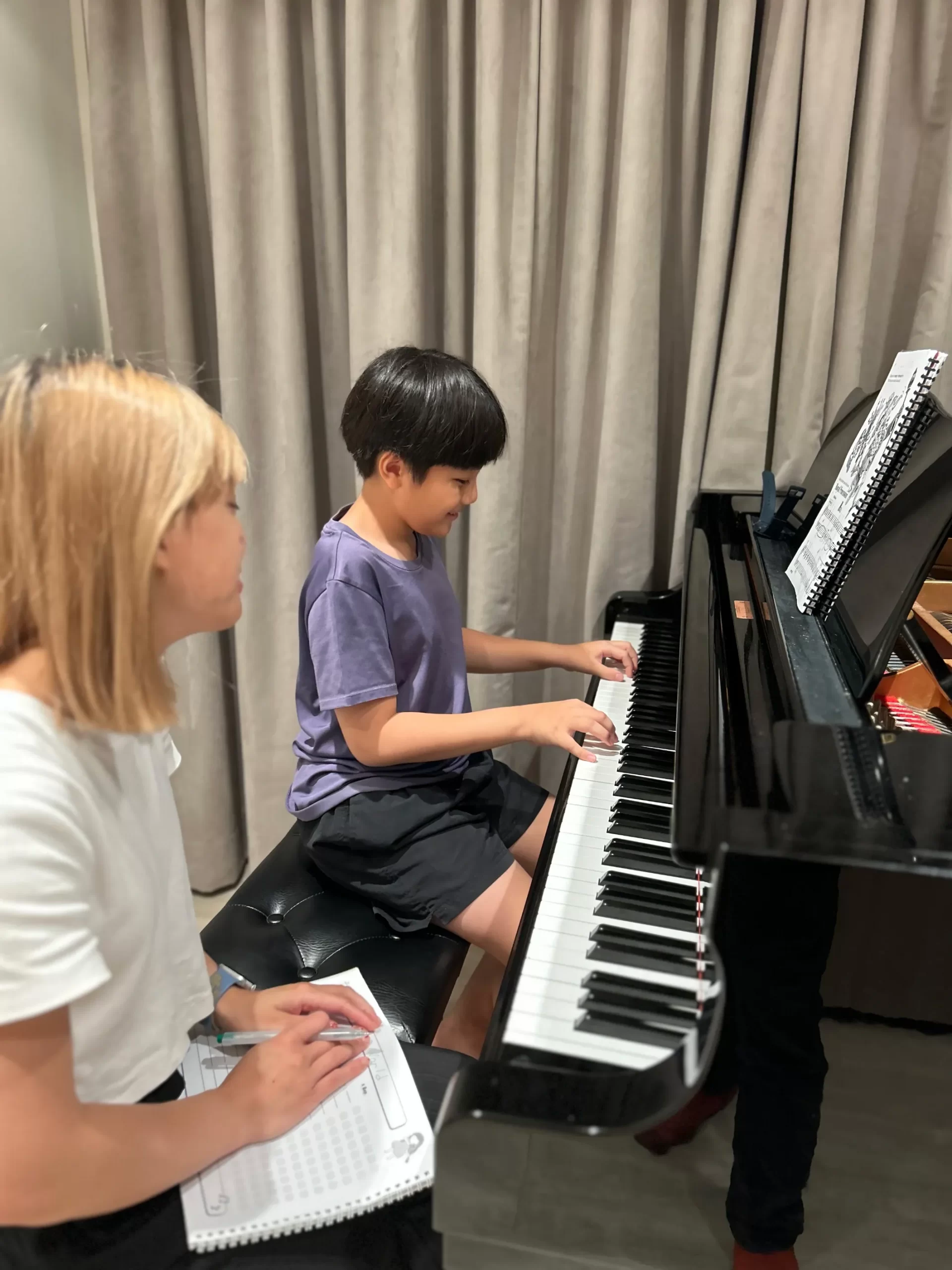
Piano – For age 5 and above
Violin – For age 6 and above
Individual Piano and Violin Lessons
- Individualised repertoire of pieces
- Theory and aural training
- Warm-ups for Long Term Learning
Individual piano and violin lessons are taught by educators trained in The Music Circle Method, from beginner to advanced. These lessons focus on instrumental study that are unique to each student’s goals and learning modality, with development planned in line with The Music Circle Method.
Teachers focus on building their technique essential for their progress as musicians. Our educators help the student develop their technique and musicianship through an individualised repertoire of pieces that progressively challenges and inspires them.
Theory and aural training is incorporated into instrumental instruction to encourage students to see the practical relevance of these subjects and their direct application to their own playing. This approach better equips students to understand and appreciate music on a deeper level as well as achieve a level of greater proficiency.
Complementary to Individual Lessons
Group Classes and Ensembles
- Fosters a sense of camaraderie
- Shared enjoyment of music
TMC’s Group classes and ensembles enable students to gain a well-rounded music education, learning alongside their peers, engaging with music at a deeper level through a broad range of subjects and activities in a social setting.
The Ensemble segment gives students the opportunity to play alongside their peers and improve on general ensemble skills and musicianship. This helps them to become more versatile and expressive musicians, and to achieve a greater level of instrumental proficiency.
Students who participate in Group class and Ensemble have the opportunity to develop collaborative skills that extend beyond their individual music training. Through working with their peers, students learn how to communicate effectively, listen actively, and contribute to a shared musical goal. This collaborative approach fosters a sense of camaraderie and shared enjoyment of music, as students support and encourage one another in their musical development, and enjoy the experience of learning and playing in a group setting.

Juries, Aural and Theory Assessments
Assessments
The Music Circle’s assessment framework is designed to provide a holistic evaluation of a student’s progress and development as a musician. By incorporating juries, aural and theory assessments, the framework enables teachers to track each student’s strengths and areas for improvement, and to tailor their instruction accordingly. This approach helps to ensure that students are consistently challenged and supported, and that they are able to reach their full potential as musicians.

Juries
- Chart students long-term learning progression and growth
Juries serve as a practical assessment tool, where a panel of selected faculty members review each student’s progress. The use of juries aids in tracking and planning of students’ progress, gives them a goal to work towards, as well as provides a valuable opportunity to assess their capabilities and identify areas for growth. Following the assessment, students receive detailed comments and suggestions for improvement that can help the teachers and students to chart their long-term learning progression and growth.

Aural and Theory Assessments
- Tailored evaluation for progress
Aural and Theory Assessments are designed to evaluate students’ understanding and knowledge of aural skills and music theory. By emphasising the importance of developing these skills alongside practical abilities, the TMC curriculum promotes a holistic approach to musical growth. The assessments are structured to cover a variety of topics including rhythm, musical terms, notation, key signatures as well as composition.
Spotlight, Public Performances such as Esplanade Concourse, Performance Classes
Performances and Community Events

Performance Class
- Showcase Students’ hard work and progress
- Express individuality and develop each student’s unique voice
Performance opportunities are a crucial component of a music student’s growth and development. Music is a performance art that allows students to express their individuality and develop their own unique voice.
Performance classes provide a platform for students to showcase their hard work and progress. By performing in these classes, students build confidence and gain motivation in their practising and musical journey. Students also develop repertoire they have been learning, offering an opportunity for both musical and personal growth in the following areas:
- Critical Listening Skills: By listening to other students’ performances and providing feedback, students learn to be attentive and analytical listeners, which can translate to their own playing and practice as well.
- Communication Skills: Students learn to articulate their thoughts clearly and effectively by providing comments to others during performance classes, which is a valuable skill in many areas of their lives.
- Reflection: Receiving comments during performance classes encourage students to reflect on their own performances and identify areas of weaknesses and strengths.
- Gaining New Perspectives: Students will be able to gain new perspectives from faculty members and peers’ comments, and incorporate them into their subsequent performances.
By providing mutually constructive feedback, students form a supportive community of musicians, building strong relationships to help each other grow and develop as musicians.
2024 Performance Class Dates – 30th March, 25th May, 27th July, 21st Sep
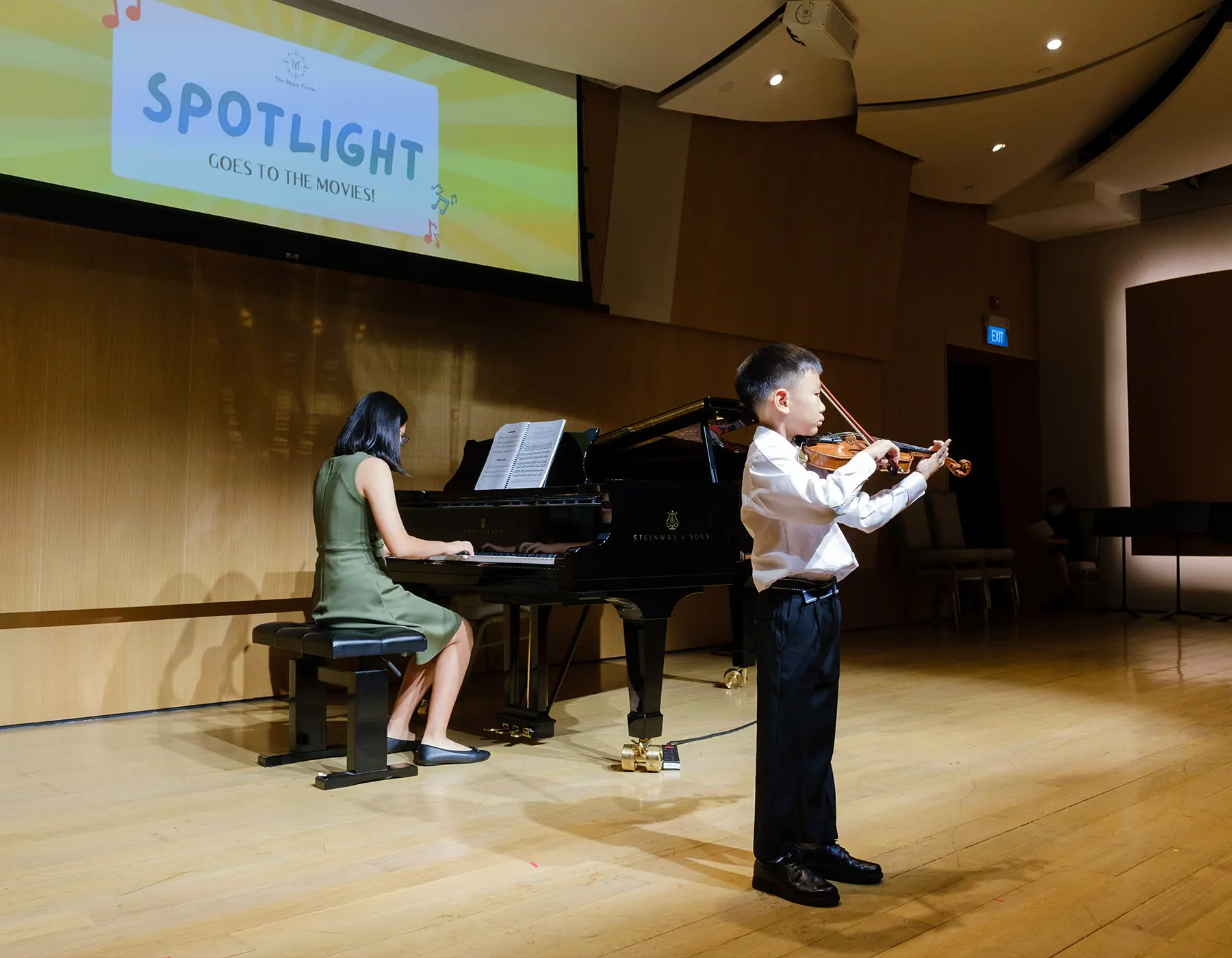
Spotlight
- A showcase of students’ skills and progress over the course of the year
- Helps drive musical growth and development
Spotlight is TMC’s annual student showcase. This event is a highly anticipated occasion where students get to perform for the entire TMC community, showcasing their skills and progress over the course of the year.
Spotlight provides a unique opportunity for students to challenge themselves and set ambitious performance goals, helping to drive their musical growth and development. It also serves as a celebration of their achievements and a testament to their hard work and dedication.
This special event creates a sense of community and camaraderie among students, inspiring them to continue their musical journeys with confidence and enthusiasm.
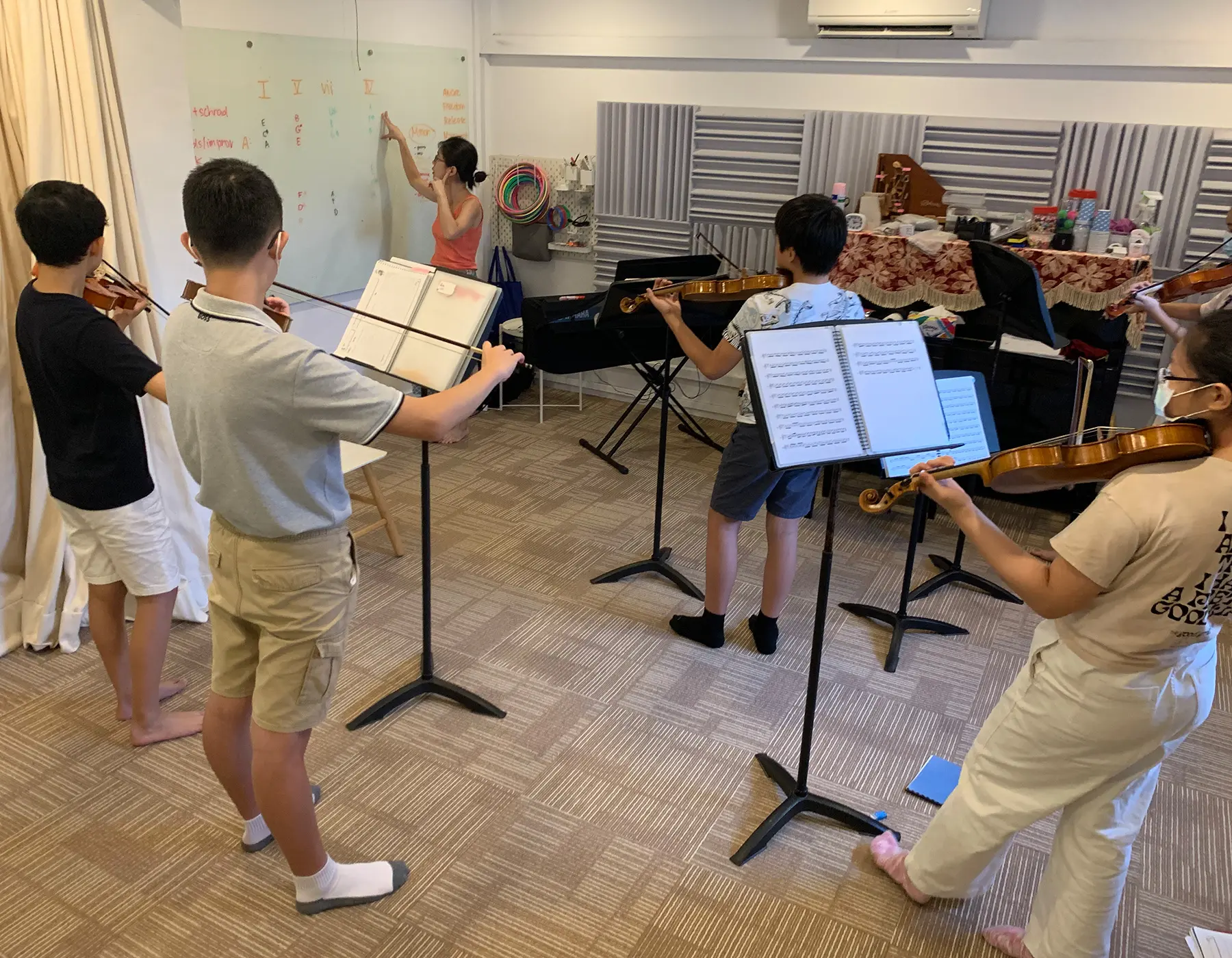
Instrumental Workshops
- Opportunity to focus on specific aspects of instrumental training
- Further develop abilities and improve overall musical proficiency
The Music Circle’s instrumental workshops provide students with the opportunity to focus on specific aspects of their instrumental training. These workshops are designed to be engaging and interactive, and are led by our experienced faculty members. By honing in on particular areas such as technical skills, musical expression or performance techniques, students are able to further develop their abilities and improve their overall musical proficiency.
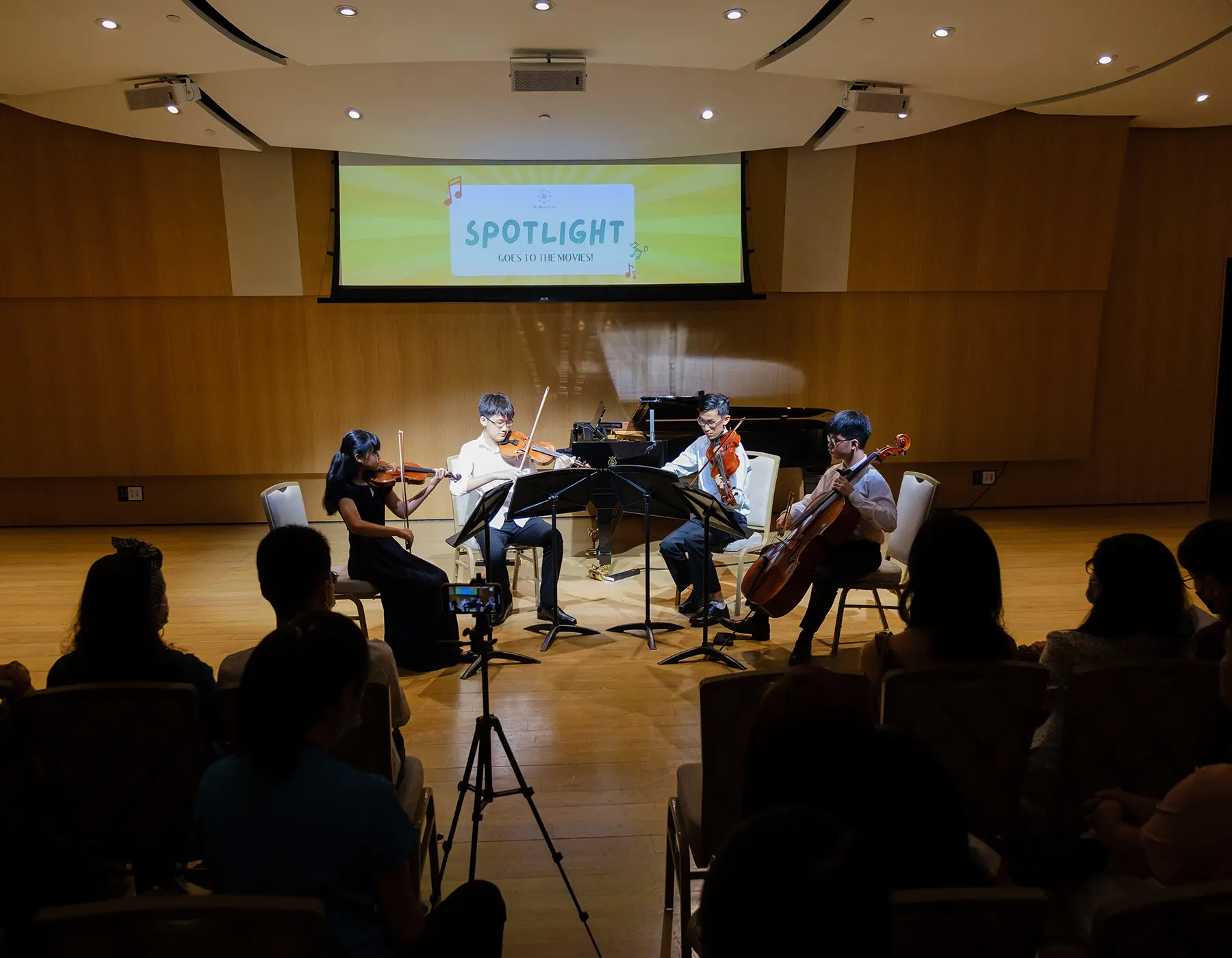
Chamber Music Academy
(Open to non-TMC students)
- Weekly chamber rehearsals and coaching for string musicians between the ages of 12 and 18
TMC Chamber Music Academy is a vibrant community of string musicians dedicated to the art of chamber music. At the core of our philosophy is the belief that chamber music provides a unique and fulfilling musical experience that fosters a strong connection between musicians. Through our programme, participants have the opportunity to explore the intricacies of ensemble playing, learn from experienced mentors and collaborate with like-minded musicians.
The Music Circle’s Chamber Music Academy offers weekly chamber rehearsals and coaching for string musicians between the ages of 12 and 18. The Academy aims to cultivate a thriving community of chamber musicians who are passionate about improving their craft, expanding their repertoire, and developing their ensemble skills.
Academy Musicians will perform at music events including TMC’s year-end Spotlight showcase. This will give musicians opportunities to gain experience and hone their musicianship and performance craft.
The programme is designed to allow students to deepen their understanding of chamber music and connect with other musicians who share their passion.
The Chamber Music Academy is open to string musicians in Singapore between the ages of 12 and 18, with priority given to TMC students.
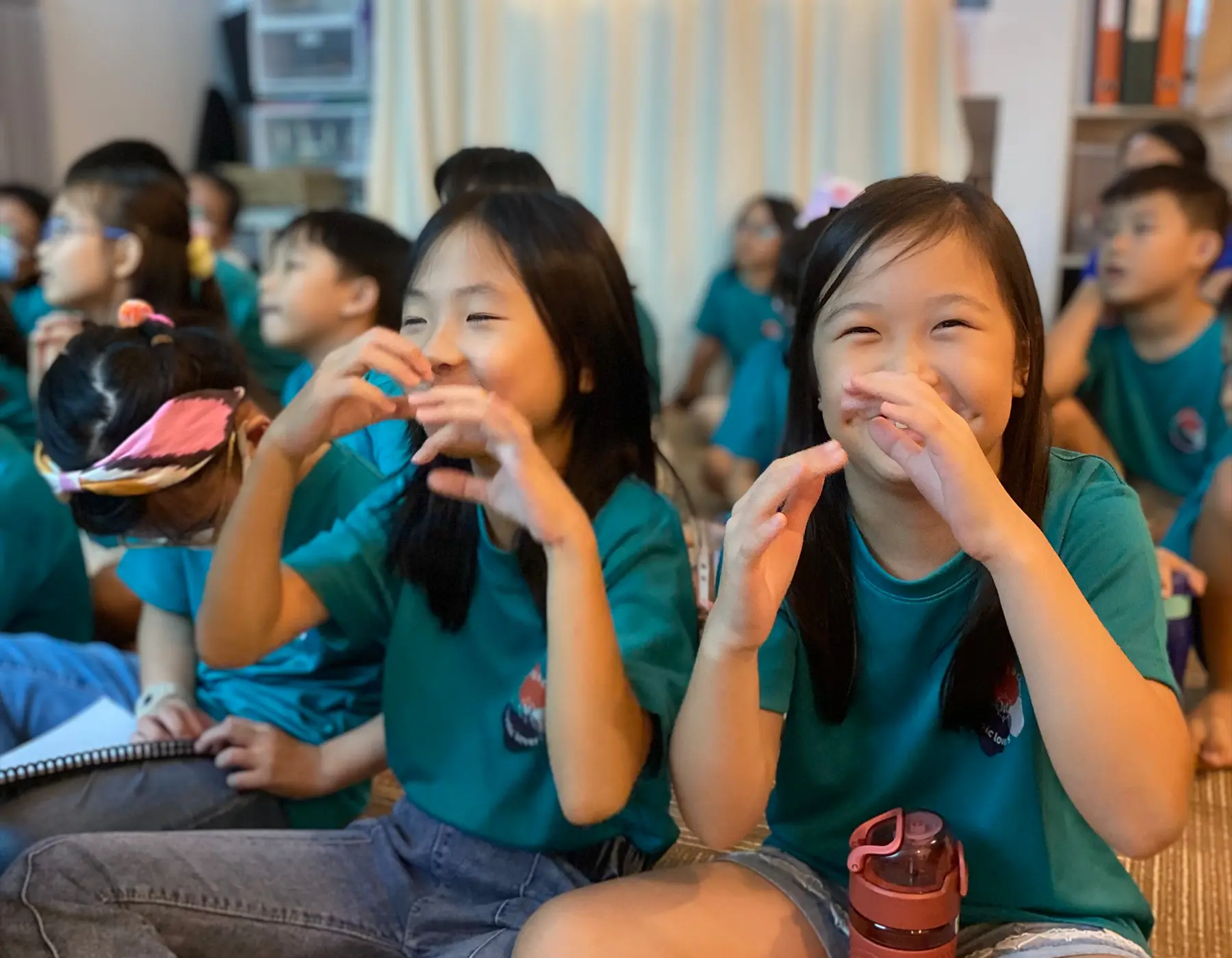
Instrumental Camps
- Build lifelong friendships and cultivate a love for music making
The Music Circle organises Instrumental Academy Camps during the school holidays, providing an opportunity for students to come together and immerse themselves in music while having fun! These camps not only allow students to learn more and work on their proficiency, but also provide them with a chance to rehearse and perform alongside their peers. By learning and playing together, students are able to deepen their understanding of music concepts and foster a sense of community and camaraderie. We believe that these camps are an important part of our students’ musical journeys, as they provide a chance to build lifelong friendships and a love of music that will stay with them for years to come.
Masterclasses, Recitals
Honours Programme
- Helping students reach new heights in their musical journey
The Music Circle’s Honours Programme is designed for students with high ability and a strong desire to excel in their musical pursuits. Students who meet the criteria and are recommended by their teachers undergo a rigorous selection and audition process. The Programme offers a unique and enriching musical experience that challenges students to grow and achieve their full potential. Students in the Honours Programme have the opportunity to take part in masterclasses and recitals. This programme helps students who are dedicated to their craft and committed, to reach new heights in their musical journeys.


Parental Involvement
Parent Workshops
- Create a musical environment at home
- Helping parents support their child’s learning outside of the classroom
Parents play a critical role in their child’s music education journey. While teachers provide guidance during class time, parents are responsible for creating a musical environment at home and supporting their child’s learning outside of class. That’s why we offer tools and resources to help parents navigate their child’s musical development and build a strong support network. By working together with parents, we believe we can create an optimal learning environment that encourages and inspires children to reach their full musical potential.
The Instrumental Academy Pathway
The Music Circle provides different pathways in the Instrumental Academy to help every child grow at the appropriate pace, while giving them the right environment and support to realise their full potential.



